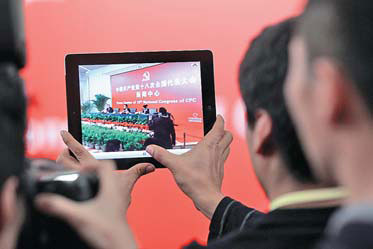More delegates use micro blogs to interact with public
|
A journalist takes pictures with a tablet computer at a news conference by Zhang Ping, head of the National Development and Reform Commission, at the Party congress on Saturday in Beijing. Zou Hong / China Daily |
A local Party chief has been using micro blog to solicit public opinions for the last two years and he found it hard to stop the habit.
Xu Gang, 54, the Party secretary of Quanzhou in Fujian province and a delegate at the 18th National Congress of the Communist Party of China, said on Saturday that he spent an average of two to three hours on his micro blog every day.
"Micro blog is a convenient channel for me to know how the public feels, especially the younger generation," he said.
Like Xu, a number of delegates at the Party congress have opened micro blog accounts on Sina Weibo, China's most popular Twitter-like service.
An estimated 20 delegates have micro blog accounts on Sina under the identity of delegates to the Party congress, while others are using the service on Tencent or other smaller micro-blogging services.
"Five years ago, it was rare to see officials interacting with the public via new media platforms during the 17th National Congress of the CPC," said Zhou Xiaopeng, Sina's deputy editor-in-chief. He believed that the number of delegates who are using micro blogs are much larger but many use nicknames and therefore, are difficult to verify their identities.
Xu Gang is one of those who prefer to hide his real identity online for fear of groundless attacks by some irrational Web users. But despite being a "hidden" user, the micro blog serves as a good platform to scan the hottest public topics, he said.
"I am a diver (a term used by people who hide their identity on the Internet), but it does not mean I do nothing," he said.
The official cited an example in which he fixed a streetlight after reading about it in a micro blog.
Some delegates without individual accounts also expressed their ideas using the local governments' micro blog.
Under a new project, Sina is inviting Party officials to have a 40-minute talk through the online platform, aimed at helping delegates interact with the public in a more efficient way.
Currently, eight delegates have participated in the online talk, including Yang Weize, the Party secretary of Jiangsu provincial capital Nanjing, and Chen Zheng, a policewoman from Shanghai.
Experts viewed the use of micro blogs by more officials as a progress.
"Although some delegates hide their identities, using micro blog to scan information is still a good thing," Sina's Zhou said.
Shen Yang, a professor specializing in information management from Wuhan University, is glad to see delegates communicate with netizens using new media.
"The awareness of using micro blogs is a must, no matter whether they use real identities or not," he said, adding that officials should be confident in using micro blogs instead of worrying about making mistakes or saying something wrong online.
Ordinary Web users also welcomed the closer links between public and officials using the new media.
Liu Xiaohang, a 26-year-old micro-blogger in Beijing, said as long as officials can help solve problems by using micro blogs, it does not matter if they register with their real identities or not.
Contact the writers at caoyin@chinadaily.com.cn, anbaijie@chinadaily.com.cn



















